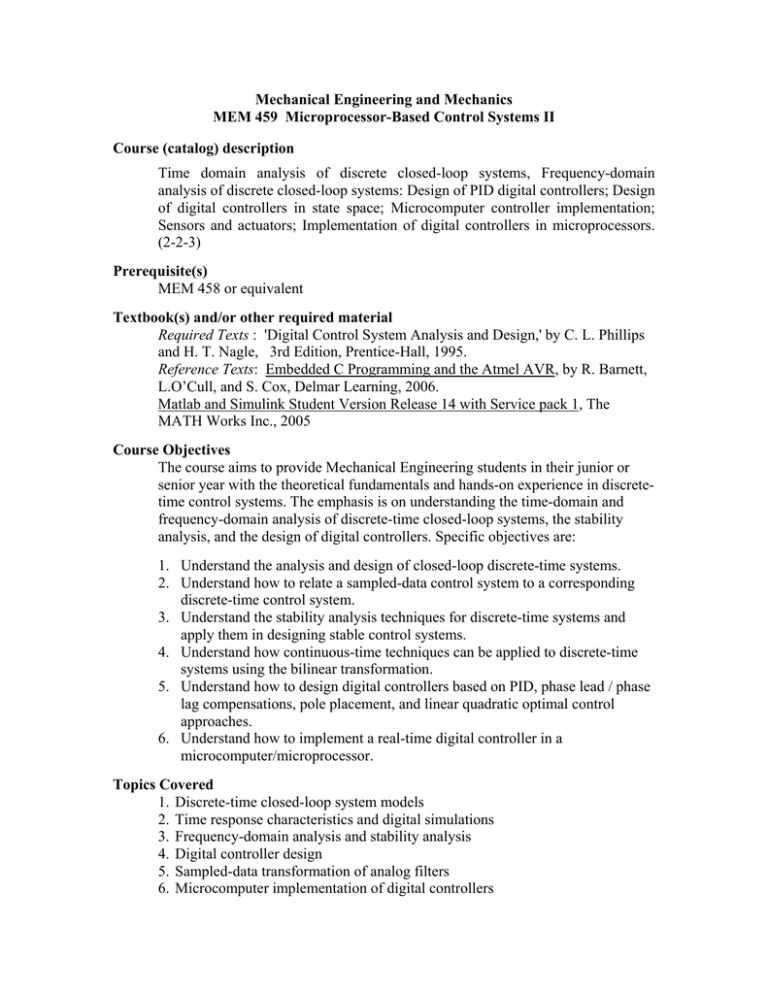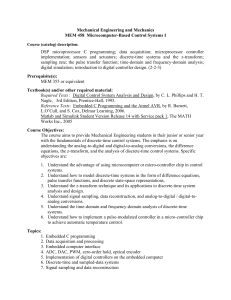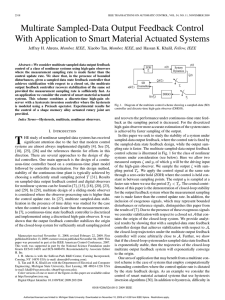Mechanical Engineering and Mechanics MEM 459 Microprocessor-Based Control Systems
advertisement

Mechanical Engineering and Mechanics MEM 459 Microprocessor-Based Control Systems II Course (catalog) description Time domain analysis of discrete closed-loop systems, Frequency-domain analysis of discrete closed-loop systems: Design of PID digital controllers; Design of digital controllers in state space; Microcomputer controller implementation; Sensors and actuators; Implementation of digital controllers in microprocessors. (2-2-3) Prerequisite(s) MEM 458 or equivalent Textbook(s) and/or other required material Required Texts : 'Digital Control System Analysis and Design,' by C. L. Phillips and H. T. Nagle, 3rd Edition, Prentice-Hall, 1995. Reference Texts: Embedded C Programming and the Atmel AVR, by R. Barnett, L.O’Cull, and S. Cox, Delmar Learning, 2006. Matlab and Simulink Student Version Release 14 with Service pack 1, The MATH Works Inc., 2005 Course Objectives The course aims to provide Mechanical Engineering students in their junior or senior year with the theoretical fundamentals and hands-on experience in discretetime control systems. The emphasis is on understanding the time-domain and frequency-domain analysis of discrete-time closed-loop systems, the stability analysis, and the design of digital controllers. Specific objectives are: 1. Understand the analysis and design of closed-loop discrete-time systems. 2. Understand how to relate a sampled-data control system to a corresponding discrete-time control system. 3. Understand the stability analysis techniques for discrete-time systems and apply them in designing stable control systems. 4. Understand how continuous-time techniques can be applied to discrete-time systems using the bilinear transformation. 5. Understand how to design digital controllers based on PID, phase lead / phase lag compensations, pole placement, and linear quadratic optimal control approaches. 6. Understand how to implement a real-time digital controller in a microcomputer/microprocessor. Topics Covered 1. Discrete-time closed-loop system models 2. Time response characteristics and digital simulations 3. Frequency-domain analysis and stability analysis 4. Digital controller design 5. Sampled-data transformation of analog filters 6. Microcomputer implementation of digital controllers 7. Time domain analysis and digital simulation of feedback control systems Class/laboratory schedule, i.e., number of sessions each week and duration of each session Two hours of lecture per week Two hours of laboratory per week Contribution of course to meeting the Professional Component The course provides the students with a thorough understanding of computer control theory and hands-on experience of implementing the controllers on microcomputers or microprocessors to enhance the performance of mechanical systems. Relationship to Program Outcomes: 0 = No content; 1 = Some content; 2 = Significant content Criteria a - k a. An ability to apply knowledge of mathematics, science and engineering b. An ability to design and conduct experiments as well as to analyzed and interpret data c. An ability to design a system, component or process to meet desired needs d. An ability to function on multidisciplinary teams e. An ability to identify, formulate and solve engineering problems f. An understanding of professional and ethical responsibility g. An ability to communicate effectively h. The broad education necessary to understand the impact of engineering solutions in a global or societal context Cont. 2 2 2 2 2 1 2 1 Explanation Evidence In this course, students learn how to apply digital control theory in the design of microcomputer control systems. Students are required to design and implement digital controllers in the lab and observe and analyze the performance of the control system. Students learn how to design a controller to achieve a desired performance. Three or four students work as a team to use their knowledge in mechanics, thermal/fluids, electronics, control theory, and computers to achieve the objective of each experiment in this course. The students are required to formulate and solve control problems based on theory and to verify their results with the experiments. This is emphasized as part of the design engineer’s overall responsibility. Oral presentation of the experimental procedure and result is required. The impact of engineering design on energy saving, living style, and society is mentioned. Textbook, Homework, Exams, Handout notes, Lab reports Lab reports Textbook, Homework, Exams, Lab reports Lab Reports Exams, Lab reports Lab reports Lab reports Textbook, Handout notes, Lab reports i. A recognition of the need for and an ability to engage in lifelong learning j. A knowledge of contemporary issues k. An ability to use the techniques, skills and modern engineering tools necessary for engineering practice 2 2 2 Students recognize that lifelong learning is necessary to stay current with the advance of control systems design and computer technology. Design of control systems is related to contemporary issues (energy saving, flight safety, and fighting terrorism, etc.). Students use MATLAB, LabVIEW, Simulink, and control systems design packages for design, simulation, experiment implementation, and analysis. Person(s) who prepared this description and date of preparation B.C. Chang 01/08/2007 Handout notes, Lab reports Handout notes, Lab reports Textbook, Homework, Exams, Handout notes, Lab reports

